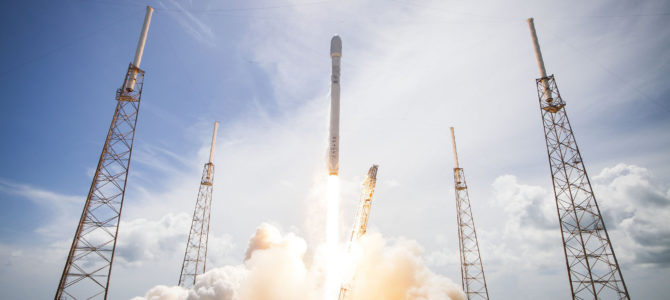SpaceX reached a milestone early Tuesday morning when it launched its 50th Falcon 9 rocket into space. The space company will be putting a communications satellite the size of a city bus into orbit.
SpaceX’s recent success has apparently sent some people over the moon with enthusiasm. Among them is former House Speaker Newt Gingrich, who used SpaceX’s February 6 launch to urge President Trump’s Space Council to “aggressively develop systems for public-private partnerships with innovative companies such as SpaceX, Jeff Bezos’ Blue Origin, Sierra Nevada Corporation, and others, where the government takes on the role of an investor — an investor that would be paid back. [emphasis added].”
Gingrich never really explains why letting government invest in the space industry — let alone on high-risk companies and missions — is a good idea. Rather, he spends most of his op-ed for FoxNews extolling the virtues of the Falcon rocket, “the most powerful commercial rocket ever made,” or waxing romantic about space flight because the Falcon rocket showed “young people [that] having a career in the space industry — even actually going to space — is as real, tangible, and achievable as becoming a dentist, a lawyer, a civil engineer, or any other job that requires focus and hard work.”
It’s as though Gingrich hoped that readers would be so enamored of space travel that they wouldn’t think to ask whether the government investing in it is a good idea.
SpaceX doesn’t show that it is, however. Founded by entrepreneur Elon Musk in 2002 with the goals of reducing the cost of space travel and colonizing Mars, SpaceX has had some success. In 2008 it launched the first privately funded rocket to reach orbit, and in 2017 it relaunched and landed a used orbital rocket, something no other space organization had ever achieved.
Yet the company has also been plagued with setbacks. In June 2015, one of SpaceX’s Falcon 9 rockets exploded on its way to the International Space Station. Another Falcon 9 rocket never even lifted off, exploding during a test fire in September 2016. Even the successful launch on February 6 had its problems, with a central booster rocket that was supposed to be recovered and reused crashing into the ocean at 300 mph. Setbacks like these have left SpaceX with a backlog of 70 missions worth $10 billion. While SpaceX wouldn’t be the first company to succeed despite many failures, the risk that it might not should be borne by private investors, not taxpayers.
History has definitely shown government investing is often a bad idea. Consider synthetic fuels. The federal government has made numerous attempts to create an industry that can produce a synthetic alternative to oil. The most recent effort was the Synthetic Fuels Corporation, for which Congress appropriated $17 billion in 1980. It was supposed to produce over 500,000 barrels of oil a day. Yet cost overruns and technical failures plagued the SFC, resulting in the cancellation of most of its projects. Luckily, only $100 million was spent before Congress cancelled the SFC in 1985.
The list of other failures of government investment in energy is extensive: The Clinch River Breeder Reactor, clean coal, the hydrogen car, and, more recently, Abound Manufacturing, Fisker Automotive, Vehicle Production Group, Beacon Power, and Solyndra. From 1961-2008, the federal government spent more than $170 billion investing in energy projects, with little to show for it.
The problem is that government does not face the same incentives that private investors do. Private investors risk their own funds and, thus, pay a cost for being wrong, in lost money or even lost jobs. That gives them a big incentive to make the right decision, to make certain that the possible payoff from an investment is worth the risk and to monitor the investment. By contrast, the governments pays no such costs.
Government can’t lose its own money because it doesn’t have its own money. It risks other people’s money, taxpayer money, when it invests. And government employees almost never lose their jobs when something goes wrong. Since the government pays no cost for being wrong, it is little wonder that government investment is seldom successful.
Government’s interaction with private space companies should be limited. If Trump’s Space Council wants to pursue goals of space exploration and national security, then it should only procure services from private space companies via a transparent process of open bidding. But the government actually investing in private companies is little more than an idea from outer space.









